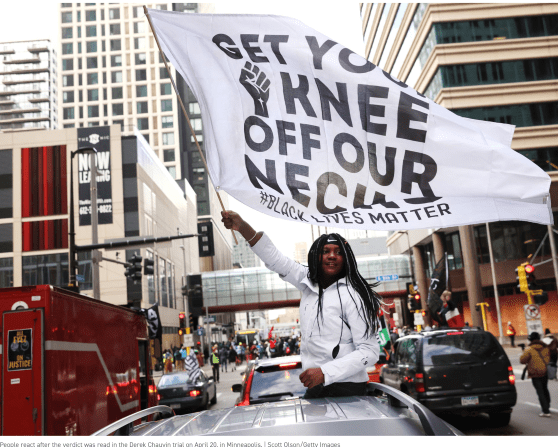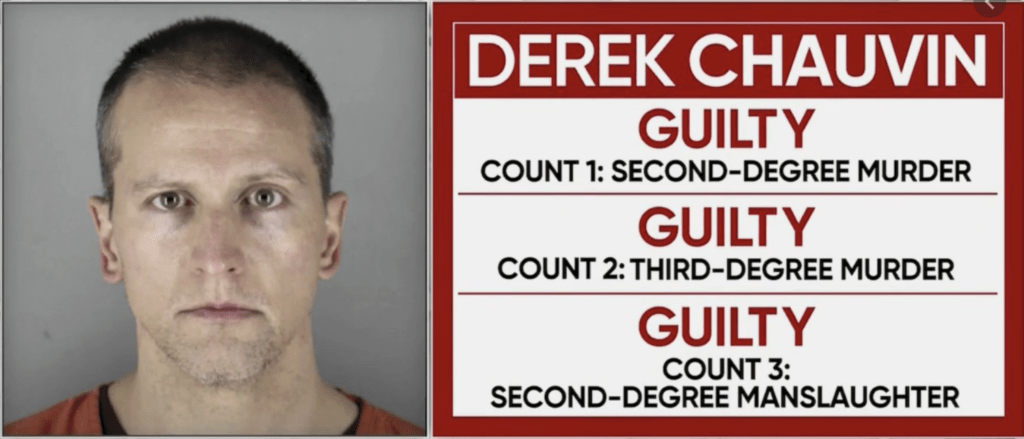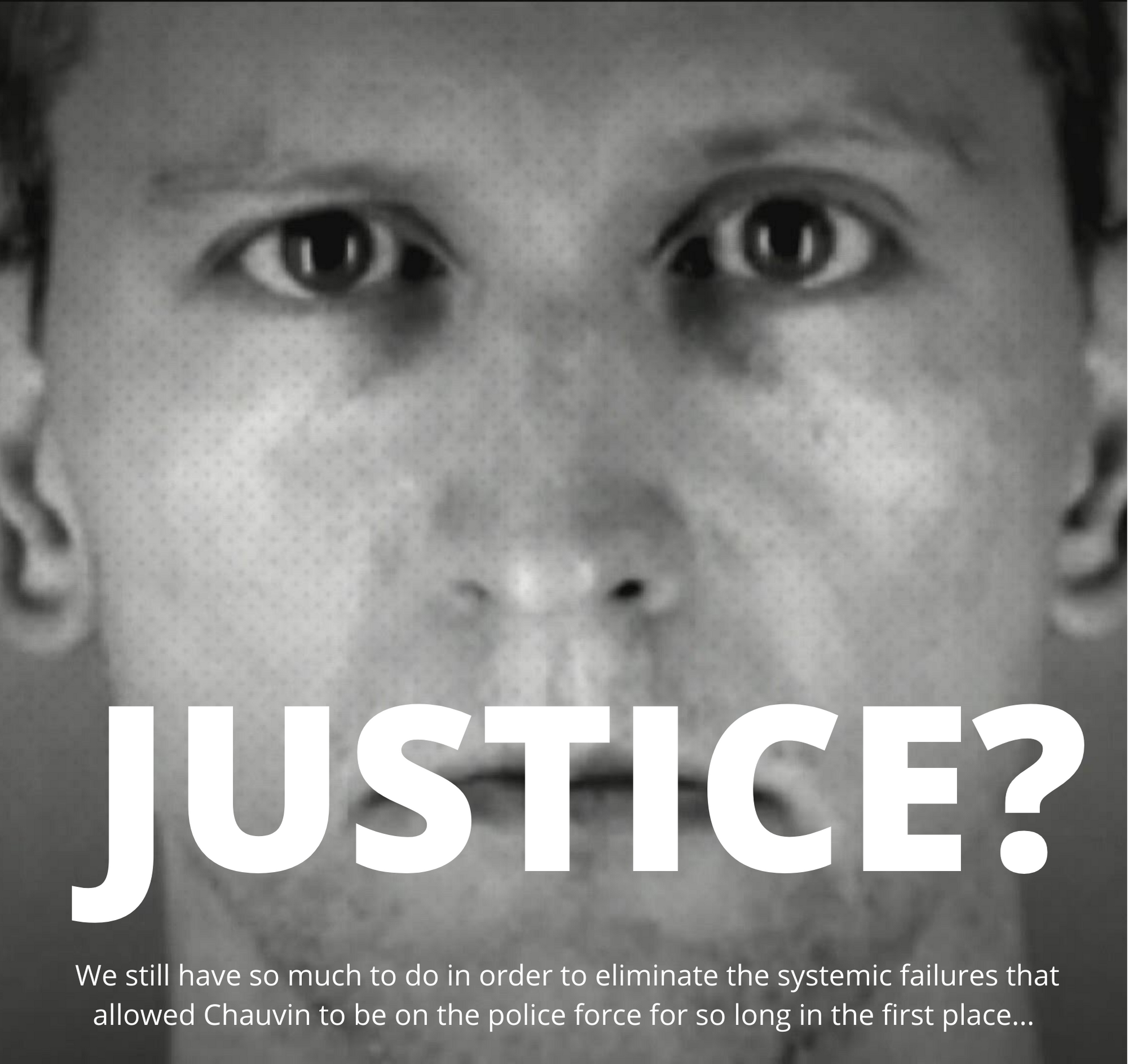Do 3 Guilty Verdicts Change Policing?
After deliberating over 2 days for 10 hours after a heavy three week trial, a jury found Derek Chauvin, a white former police officer guilty. Guilty of second-degree murder, third-degree murder and second-degree manslaughter for the killing of Mr. Floyd, a Black man, on a street corner last year on Memorial Day.
As the verdict was read…GUILTY…GUILTY….GUILTY…the world gasped a huge sigh collectively.
In spite of video capturing Chauvin squeezing the life out of George Floyd in front of Cup Foods in Minneapolis last May, it was never clear that the former police officer would be convicted of anything, let alone murder. Regardless of increased attention to police brutality, specifically against Black Americans, it’s still a rare occurrence for officers in the U.S. to be charged, let alone convicted.
Last Tuesday’s verdict on the Chauvin trial etched a huge moment in the nation and world’s continuous racial justice reckoning. There is a public demand for accountability of the police but will it actually happen? Experts on race, policing and the law were asked to comment on the verdict and mainly where does the system and society go next?
Read some of their thoughts on the verdict below:
‘
This case has set the bar on what holding a police officer accountable in America should look like’
CHANDA SMITH BAKER
______________________________________________
Chanda Smith Baker is the chief impact officer and senior vice president of the Minneapolis Foundation.

During this trial, I could not bring myself to hope, but today the justice system worked. I am clear that justice prevailed because Minnesota has an attorney general, Keith Ellison, who has moral clarity and a commitment to justice. Minneapolis has a police chief who, after viewing the video, immediately took action, firing those officers and later testifying that what happened was against the policies and training of the Minneapolis Police Department. This case has set the bar on what holding a police officer accountable in America should look like. This is not what we’ve seen in so many other cases. This verdict reminds us that justice has not prevailed for far too many and — without continued commitment — it will not endure.
‘No, the justice system did not work’
KWAME RAOUL
_____________________________________________
Kwame Raoul is the attorney general of the state of Illinois.
It is important to note that the justice system is not solely composed of proceedings that come after a crime. The justice system also includes proactive steps that are taken to avoid these tragedies in the first place. For instance, if Derek Chauvin had a history of complaints filed against him, should he have been in a position to commit murder in the first place? So if you look at the “justice system” as including taking action to address previous misconduct, then no, the justice system did not work. Ideally, the justice system should prevent death instead of reacting to it. With respect to this court proceeding, you can argue that the system worked.
I would emphasize that this is one case. The jury is still out on the long-term implications here. We still have so much to do in order to eliminate the systemic failures that allowed Chauvin to be on the police force for so long in the first place. Looking at just this verdict as a final answer is taking a “bad apple” approach to criminal justice reform instead of taking a holistic approach to the challenge of constitutional policing.
‘It is too early to know whether this verdict is a flash in the pan or a sea change’
BY CHRISTY LOPEZ
________________________________________________
Christy Lopez is a professor from practice at Georgetown Law.
One aspect of the trial that was encouraging was the willingness of so many law enforcement officials to state unequivocally that Derek Chauvin’s use of force was unlawful and unnecessary. That was likely quite significant in the jury’s reaching the verdict it did, and it underscores the importance of law enforcement officers policing their own — not only to ensure that an officer is held accountable for wrongdoing after the fact, but also to prevent harm from occurring in the first place.
‘This case is an outlier’
BY PHILIP M. STINSON
______________________________________
Philip M. Stinson is a professor of criminal justice at Bowling Green State University and the author of Criminology Explains Police Violence.

The criminal justice system worked with the jurors returning guilty verdicts on all three counts. The verdict, however, likely means little in terms of the long arc of holding police in America accountable for their actions. This case is an outlier. Most instances of police brutality are not captured on video, and most do not receive the level of media attention that the Derek Chauvin case has garnered.
I study police crime and police behaviors. Roughly the same number of people are killed by police officers every year in this country, and roughly the same number of police officers are charged with murder or manslaughter each year. Less than 2 percent of the on-duty police officers who kill someone are ever charged with a crime and held accountable in the criminal courts. While justice was served with the guilty verdicts against Chauvin, my fear is that it will not lead to meaningful reforms in policing.
There are more than 18,000 state and local law enforcement agencies across the country employing more than 700,000 sworn officers. The Chauvin trial will do little to change the culture of policing at many of those law enforcement agencies. That is because many police officers exhibit fear of Black men and Black boys. Until we deal with this core value of the police subculture, it will be difficult to change police behaviors.





